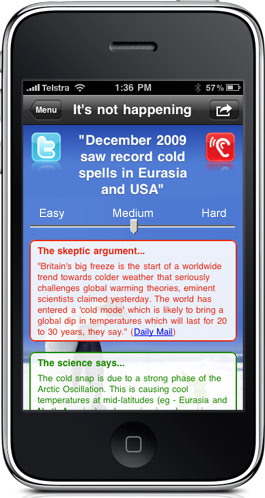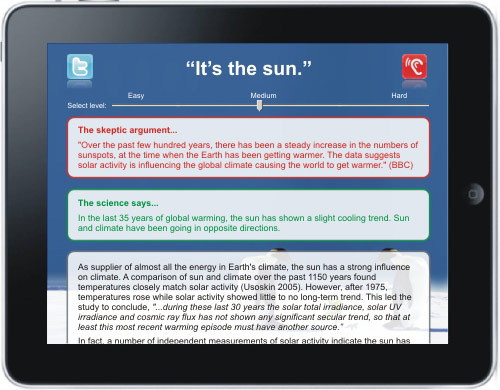Communicating climate science in plain English
Posted on 4 August 2010 by John Cook
A few weeks ago, I received an email from Australian astrophysicist Michael Ashley who had just read a post on Real Climate about the need to communicate climate science at different levels. He was particularly struck by one comment that proposed having a slider at the top of climate articles where the reader could select the technical level of the article. Michael suggested the Skeptical Science iPhone app could have a similar slider allowing people to choose the level of explanation. My initial reaction was horror at the sheer amount of work involved in such an endeavour. But over the next few weeks, the idea grew in my mind to the point where it became irresistable. I think I just got inceptioned!
So against my better judgement, I'm now planning to completely overhaul Skeptical Science. For all the skeptic arguments, there will now be three different levels for each rebuttal. I'm not sure what headings will be used for each level but it will be something like this:
- Easy: explaining the climate science in plain English, the way you'd explain it to someone in an elevator or at a pub. So the response needs to be short, simple, understandable to the average person
- Medium: this goes a little deeper, discusses the evidence in more detail, provides links to peer-reviewed papers without necessarily going into the nitty gritty of the methodologies or technical aspects of the science.
- Hard: this might contain detailed mathematics, equations, methodologies on how measurements are taken, the nitty gritty of data is processed, etc.
Currently, I'd rate all the current rebuttals at 'Medium' level. So the most important stage of this new system will be to parse all the existing rebuttals into shorter, simpler versions written in plain English. I already went through this process with a handful of skeptic arguments for the Irregular Climate podcast. It's been an interesting and learning experience, trying to boil several pages of dense content into a few paragraphs of plain English that you can read out aloud without sounding like a robot (well, at least I hope I don't sound like a robot). A good example of 'Medium' versus 'Easy' would be the blog post on 1998 cherry picking versus the boiled down podcast transcript.
I'd also like to include hard/advanced versions of each rebuttal. Websites that operate at this level are Tamino's Open Mind, Real Climate and Kelly O'Day's Climate Charts & Graphs. Kelly O'Day has already graciously agreed to adapt some of his blog posts into more technical rebuttals. I'm hoping some of the other more technical climate bloggers might also be willing to adapt their blog posts into rebuttals (hint, hint). Probably the closest thing to this level at Skeptical Science would be some of Peter Hogarth's posts, as Peter likes to delve into the technical aspects of how measurements are taken (which is understandable as that's what he does for a living). Often his blog posts read like a peer-reviewed review paper. However, I've been constantly holding him back, asking him to trim his text, remove the technobabble, keep it simple. Well, Peter, the leash is coming off :-)

How the tabs might look with the 3 level system.
Restructuring the database and reprogramming the website to include tabs (as shown above) is fairly straightforward. The iPhone app on the other hand is another matter. I asked Shine Technologies whether it would be possible to incorporate a slider system in the iPhone app and they said yes but create the data first. So first things first, I have to get to work on the content. Nevertheless, I couldn't resist doing a mock-up of how it might look on the iPhone (quick disclaimer: Shine Tech are the gurus at designing sexy iPhone interfaces):

How I imagine the iPhone app would work is the Easy option would be selected by default. They can then slide up to Medium to get a bit more meat or if they're a glutton for punishment, continue onto the Hard level. If there's no Hard version, that option would be greyed out. Now a Skeptical Science iPad app doesn't exist (yet) but I couldn't resist doing a mock-up of how it might look here (a guy can dream):

So I have two requests from Skeptical Science readers:
- Feedback on the slider system: I welcome suggestions on how this might work. Is there better terminology than "Easy/Medium/Hard"? I like the more whimsical "Plain English/Slightly Technical/Boffin Technobabble" but it's both too wordy for the iPhone and well, a bit silly. Perhaps "Basic/Intermediate/Advanced"? Thoughts on this and the 3 level system in general is welcome.
- Help write the different versions of the rebuttals: there are currently 119 skeptic rebuttals which need to be parsed into Easy and Hard versions. Other rebuttals of these same skeptic arguments exist on other blogs so if you're a blogger who has already written a simpler or more technical version and don't mind reposting on Skeptical Science, your contribution would be much appreciated (and credited, of course). Or if you'd like to help convert my rebuttals into simpler, plain English, your help is very welcome!
I know what most of you are thinking: "I'm not qualified to write about climate science". I've learned over the years that it's often the non-scientist who is best able to express climate science in a way that the average person can understand. No offense to any scientists reading this but sometimes you boffins have trouble boiling down your science into plain, simple terms (Kevin Judd is an exception to this rule). Making climate science accessible to the general public is of crucial importance these days so I urge you all, scientist and layperson, to consider contributing to this effort.
Currently, I'm programming a discussion forum for Skeptical Science authors. What will happen next is if anyone volunteers to help out, I'll grant you access to the forum where there'll be discussion on how to approach this whole process and coordinate our efforts. This will also be a place where we can post our attempts at plain English climate science and other authors can give feedback and suggestions, as well as discuss the general issues of climate science communication.
If you're interested in helping, please either post a comment below or directly email me.































 Arguments
Arguments






























Early next week, I'll start a forum where all the authors can get together and first discuss the general approach, terminology, etc. Then I'm thinking the way authors submit proposed text is to first submit it as a new thread in the forum. That way, other authors can offer feedback/suggestions and the text can be honed before it gets 'officially published'.
But like any social media experiment, who knows how this will evolve - first step is get the forum going then see what happens.
"John's explanations are quite accessible to anybody with a high school diploma"
I have various anecdotal evidence that this isn't the case. I have friends and family with high school or higher levels of education that have trouble understanding the explanations on my site. My wife Wendy (tertiary education, an Arts degree... not that there's anything wrong with that :-) often complains that it gets too technical. The climate communication workshop run by Jan Dash also suggests the detail is too complicated for the average person on the street.
So there is a definite need for plain English versions of the rebuttals. The emphasis here, the most important element of the multi-level system, is the Easy version. In my mind, the Hard version is almost an optional extra (although when I suggested having just the Easy and Moderate versions, one scientist I was speaking too insisted having the Hard version was important too).
Believe me, I don't go looking for more work to keep myself busy. When this idea was first suggested to me, I tried to put it out of my mind. Too much trouble! But the more I thought about it, the more I saw the need for plain English versions. We need to be communicating the realities of climate science to the general public in a way they can understand. If we're not reaching the average person, then what's the point?
Haven't really thought through how to approach translations with the new system. Don't want to put too much stress on you guys :-) That'll be something to discuss on the forum.
Re the translator forum, yes, will probably have one for each language.
Re the many features, I'm getting lost too - it's really getting to the point where I can no longer put off adding drop downs to the navigation links.